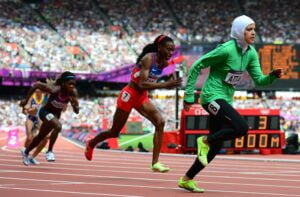ButSpeak.com
News which Matters.

French officials aim to reconcile secularism laws with inclusivity by finding a creative solution for Muslim sprinter Sounkamba Sylla to wear her hijab at the Paris Olympics opening ceremony.
In a bid to reconcile national laws with inclusivity, French government and Olympics officials are seeking a creative solution to allow Muslim French sprinter Sounkamba Sylla to wear her hijab at the Paris Olympics opening ceremony. The move comes as thousands of athletes, including many who wear hijabs, prepare to arrive for the Games, placing an international spotlight on France’s tensions over national identity and perceived discrimination against Muslims.
Sounkamba Sylla, a member of France’s 400-metre relay team, recently expressed her frustration on Instagram, stating that her hijab would prevent her from participating in the highly anticipated opening ceremony along the Seine River. “You are selected for the Olympic Games, organized in your country, but you can’t take part in the opening ceremony because you wear a scarf on your head,” Sylla posted. She has not yet responded to requests for further comments.
France, home to Europe’s largest Muslim minority, strictly enforces secularism laws that ban state employees and school pupils from wearing religious symbols in public institutions. Rights groups argue that these regulations effectively discriminate against Muslims. Eager to avoid a public relations issue with global attention on the Games, French officials are determined to find a solution for Sylla.
“Our citizens expect us to follow these principles of secularism, but we also need to be inventive about solutions to make everyone feel good,” said Amelia Oudea-Castera, Minister for Sport and the Olympic and Paralympic Games. She added that Sylla “understands our principles, our rules.” David Lappartient, President of the French Olympic Committee, echoed these sentiments, noting that the French team is “taking part in a public service mission and in this respect it is obliged to observe secularism.” He acknowledged that the French approach “is sometimes incomprehensible in other countries” but remained optimistic about finding a solution before the gala ceremony.
While French sporting authorities have banned religious head coverings in various sports such as football, basketball, judo, and boxing, the International Olympic Committee (IOC) does not have any rules against wearing religious head coverings. Maria Hurtado, spokeswoman for the U.N. high commissioner for human rights, criticized the French government last year for its stance on the hijab for French athletes, emphasizing that “no one should impose on a woman what she needs to wear, or not wear.”
As the Paris Olympics draw near, the eyes of the world will be on France to see how it navigates this delicate issue, balancing its secularism laws with the need for inclusivity and respect for religious freedom.